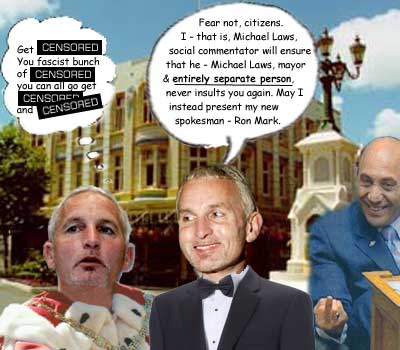Behind the facade
There's a bit of debate in comments over the quality of the information provided to voters on which to base their decisions in referenda particularly, of late, the decision on reducing councillor numbers.
So let's do a little post-modern deconstructionalist critique thereof, shall we Watchers?
Advantage 1: Some savings may be made in administration costs through reducing the number of councillors (telephone/travel/printing etc).
No doubt a few postage stamps will remain unused. And a few less agendas copied. Fewer phone calls? The Mayor prefers to send out his "What to say and how to vote" commands by email anyway. And if anyone thinks there won't be the unseemly scramble to grab whatever ratepayer-subsidised travel is available just because there's fewer hands shooting out to claim it, they're dreaming.
Advantage 2: It may be possible to reduce the amount paid out each year for councillor salaries and reduce the overall salary pool.
Demonstrably wrong. Illegal, in fact. So either a deliberate lie or the much-vaunted "Working Party" couldn't get such a basic fact correct.
Advantage 3: Groups tend to work better with smaller numbers.
Unsubstantiated opinion at best.
Gosh, yes. And an individual tends to achieve a lot more working alone than when he or she is forced to sit in a lengthy meeting to get sign-off on everything. So why 10? Why not the eight originally suggested? Heck, why not Field Marshall Sir Michael Laws, Ruler for Life?
Why run companies with boards? Why not just let an all-powerful figure run the whole shebang, like say Alan Bond or Conrad Black? They'd never stuff it up.
Of course fewer mind applied to a problem means fewer solutions, less diversity, less chance for alternative viewpoints to be heard. But then that was the plan all along.
Advantage 4: The rural community board could play a more prominent role.
Yes it could. But where's the strategy for it to do so, especially now the rural ward is to be disestablished? Without a plan for it to do so, that doesn't even amount to a hollow promise. It's simply baseless speculation.
Disadvantage 1: Fewer councillors may result in each councillor being paid more.
May? Let's state it again: LGNZ and other authorities confirm that the pool for payment to councillors is fixed and unalterable. They will get more. So again, ill-informed at best, blatant lying at worst.
Disadvantage 2: There may be no salary savings overall if the remuneration pool stays the same.
May?! This is perhaps the one incontrovertible fact in the whole issue and they've got it wrong a third time. Or lied a third time. Take your pick.
Disadvantage 3: Councillors would have a greater workload.
We are - gasp - in agreement with the Mayor on at least one thing. For the money they're getting paid there are many councillors who don't do nearly enough to justify it. But many of the offenders are under his leadership. So why not tackle the issue with a diVision wake-up call?
What of course will happen is that the handful of councillors who work hard for the community will now be forced to work even harder, whilst the free-loaders who barely bother to read an agenda and the double-dippers who make a comfortable living getting themselves elected to multiple public offices will continue as always. Unless the Mayor shows some leadership. Well, Mickey?
Disadvantage 4: It may reduce the opportunity for some groups in the community to be represented around the council table.
Yes, it may well. In fact there are many - including this blog - who are convinced that it will. Given that it's acknowledged as a potential disadvantage, where is diVision's strategy for coping with this? Where is the commitment to seeking out and embracing alternative points of view from all in the community? To distilling the opinions of as many residents as possible - after all, we all have a stake in Wanganui, whether we're diVision voters or not - and synthesising the best possible solution regardless of ideology... all right, we'll stop now. We know it's diVision we're talking about, Watchers. We were only joking.
Disadvantage 5: Councillors may have less contact with individuals in the community.
Simple maths suggests less councillors = less contact. That's bad for democracy. A lot of the contact councillors have with people isn't in a formal setting but while they're active in the community in their other roles - shopper, dog walker, pram pusher etc. Rdduce the number of faces and you reduce "face time".
Again, this could be at least partially compensated for by implementing diVision's pre-election promises, such as that of a "Mainstreet mayoral office" in which Mickey, Dotty and the dwarves would regularly sit, waiting to hear what ordinary citizens thought of them. Now that would be fun.
We've claimed the information that went out with the referendum was biased. Perhaps that wasn't quite the right word. We can think of several others: incomplete, poorly researched, misleading, and just plain stupid.
Comments on this post are now closed.

